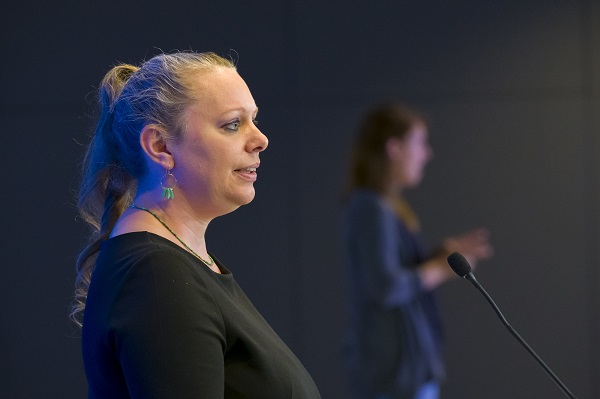 Carole Dieschbourg, Luxembourg's Minister of the Environment, Climate and Sustainable Development;
Credit: SIP
Carole Dieschbourg, Luxembourg's Minister of the Environment, Climate and Sustainable Development;
Credit: SIP
On Monday 20 December 2021, Luxembourg's Minister of the Environment, Climate and Sustainable Development, Carole Dieschbourg, participated in the last European Union (EU) Environment Council of the year.
During the policy debate of EU ministers on the European Commission's "Fit for 55" legislative package under the European Green Deal, which aims to allow the EU to reduce greenhouse gas emissions by at least 55% by 2030, Minister Dieschbourg called for the implementation of this package in a credible and effective manner and as soon as possible. She said that European political leadership in the fight against climate change was bearing fruit, referring to the adoption of a climate neutrality objective by most of the major world economies, in the context of the recent COP26 summit in Glasgow.
Minister Dieschbourg also recalled Luxembourg's reservations with regard to the Commission's proposal to establish an EU Emissions Trading System (ETS) covering the road transport sectors and buildings. The Grand Duchy deems this proposal controversial in particular for its expected negative financial impacts on the most vulnerable households. Aware of the emission profiles of these sectors evolving in the opposite direction of what is necessary and considering the urgency to reverse the trend, Luxembourg's Environment Minister proposed to alternatively strengthen depollution at the source, by focusing on strengthened sectoral standards.
Minister Dieschbourg reiterated her support for a just transition leaving no one behind, but expressed her doubts over the Commission's proposal for a Social Climate Fund as the most appropriate means to achieve this and suggested that these discussions required further development.
As was the case at the recent European Council, discussions extended to rising energy prices. Minister Dieschbourg recalled that this increase was mainly due to the EU's dependence on fossil fuels and recalled that investment in renewable energies and energy efficiency were the best response to this dependence.
The role of nuclear energy was also raised by some delegations during the discussions. Luxembourg's Environment Minister said that European resources should not be invested in either fossil fuels or nuclear power.
Regarding the EU legislation on batteries, Minister Dieschbourg addressed the next French Presidency, requesting that a high pace of negotiations be maintained. According to the minister, the adoption of the legislation as soon as possible is essential to allow the actors concerned to adapt quickly to the increasingly increased demand for batteries linked to the development of large-scale electric mobility. To achieve this, she supported the comprehensive and sustainable “life cycle” approach with a view to a circular economy. To this end, it is essential to have clear, precise and coherent rules, ambitious objectives while leaving the Member States the room for manoeuvre necessary to guarantee quality waste management.
Concerning deforestation, the European Commission recently drew up a proposal for a regulation aimed at ensuring that products imported to and exported by the EU come from sustainable production, thus removing products responsible for deforestation or forest degradation from the European market. In a first step, the European legislative proposal targets wood products, palm oil, cattle, soybeans, coffee and cocoa.
Minister Dieschbourg welcomed the Commission proposal which reflects the EU's commitment to the fight against climate change, deforestation and the loss of diversity. While recalling that global forests absorb a third of global CO2 emissions and shelter the vast majority of terrestrial biodiversity, she stressed the urgency to act without delay. She thus pleaded for an ambitious settlement by tackling the main driver of deforestation, i.e. the expansion of agriculture, which is responsible for 90% of global deforestation. According to the minister, it is also important to put in place a common and harmonised framework for implementation, a clear mechanism applicable to all stakeholders and a transparent and effective sanctions regime.
Finally, Minister Dieschbourg asked to incorporate into the new regulation provisions relating to international law, in particular in the field of human rights and the protection of the rights of indigenous peoples, and to extend the field of application to other ecosystems which are rich in biodiversity, as well as other products generating devastating effects on forests, such as processed meat and rubber.








